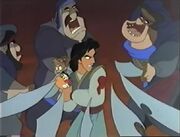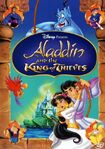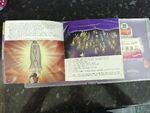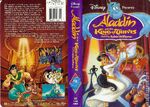Aladdin And The King Of Thieves is a 1996 animated direct-to-video film that is the second direct-to-video sequel to the Disney animated feature Aladdin. Aladdin And The King Of Thieves serves as the final chapter of the Arabian Nights-inspired Disney stories that began with the theatrical feature Aladdin (1992) and continued with its first direct-to-video sequel Aladdin: The Return Of Jafar (1994) and the Aladdin animated TV series (1994–1995).
Robin Williams returned to voice the Genie after Disney apologized for the use of his likeness in the promotion of the original Aladdin film (Williams believed Disney had broken the terms of his contract). Dan Castellaneta had actually recorded all the dialogue of the Genie for this film, as he did with the previous sequel due to Disney's differences with Williams, but his recording session was not used when Robin Williams agreed to reprise his role.
This film grossed $186 million, making it the fourth-highest-grossing direct-to-video animated feature film of all time. In 2005, the film was re-released as a Special Edition DVD, with digitally restored picture and remastered sound. The DVD however has the film matted to 1.85:1 Widescreen, an aspect ratio Disney never uses for animation. The DVD went back into the Disney Vault along with the other two films in the series in January 2008. The movie was released on Blu-ray with Aladdin: The Return Of Jafar in a Disney Movie Club exclusive combo pack on January 5, 2016. Both sequels were also released on digital for general retail the same day as the Blu-ray release.
The film is inspired by the tale Ali Baba And The Forty Thieves from the 1001 Arabian Nights, replacing Ali Baba with Aladdin, and for the first time since the original Aladdin, the film has a completely new soundtrack instead of the rearranged music from the original film for Aladdin: The Return Of Jafar and the TV series.
Synopsis[]
It is a time of celebration. The defeat of Jafar has long since passed and Arabia is at peace as people from near and far are arriving in Agrabah to attend a grand celebration, Aladdin and Princess Jasmine's long awaited and much anticipated wedding has finally arrived. Everyone is getting ready for the big event and they all express their excitement to the occasion, but the The Sultan discovers that the groom is no where to be found. Aladdin is revealed to be at his old hovel, where he recovers a dagger, the only memento of he has of his lost father, who had died when Aladdin had been a small child. Aladdin reveals to Genie that he is worried as to what kind of father he will be in the future since his father was never around, but Genie reassures him and they head to the palace for the wedding.
Meanwhile, unknown to the guests or guards, the legendary Forty Thieves and their leader, the King of Thieves, have sneaked into the Agrabah to raid the wedding, while at the same time to steal a particular piece of treasure. The ceremony begins and it starts off beautifully, as Aladdin and Jasmine are about to say their vows to each other, the ceremony is interrupted by the Forty Thieves who start to steal treasures from all the guests after triggering a stampede with the elephants some of the guests arrived on. While Jasmine, Abu, Magic Carpet, And The Genie fight out the thieves, Aladdin faces off against the King Of Thieves, who is trying to steal a particular wedding gift from Aladdin and Jasmine: a scepter.
Aladdin, Jasmine and the rest of their gang successfully stop the raid and drive the thieves away, however the wedding must now be postponed as the wedding pavilion needs to be rebuilt due to the Thieves' attack. Aladdin and company are wondering what the thieves were after, but Aladdin confirms that they were after an unusual staff among the treasures given as wedding presents. When Iago asks why out of all the gifts would the Forty Thieves be after a staff, it suddenly lifts up into the air and reveals to contain an oracle, able to see into the past or the future, but is only able to grant an answer to one question asked per person.
Overcome with desire to know more about his family, Aladdin starts to wonder about his past, in order to get the answers he needs. The oracle reveals, much to his shock and surprise, that his father is alive. At his hovel, Aladdin reflects over the recent news and reveals to Jasmine his conflicting thoughts over whether or not he should learn about his father, since he had abandoned him as a child. Jasmine encourages Aladdin to learn more about him and asks the oracle about his long-lost father, and is told to follow the trail of the Forty Thieves, stating that Aladdin's father is "trapped within their world". Believing him to be their prisoner, Aladdin tracks them down and stows away into their hideout. He is shocked to find that his father is not their prisoner at all, but their leader: Cassim, the King of Thieves, the very man he fought during his wedding's invasion. But, family or not, Aladdin has trespassed in their lair and the Forty Thieves are eager to have him punished for it. Cassim, however, suggest that Aladdin instead face "the Challenge" - an initiation ritual - where he must defeat another one of the Forty Thieves and take his place. Aladdin eventually defeats Cassim's right-hand man, Sa'Luk, in battle, gaining him a place among the thieves. It is then that he learns the true motives behind the raid, and his father's leave of absence from his family: he had discovered evidence of the existence of the Hand Of Midas, a powerful artifact that can transform anything it touches into solid gold. Cassim believed that, with the Hand, he could return to his family and give them the life they deserved instead of one living out in the streets, and had instigated the raid so he could capture the oracle's staff so he may question the seer as to the precise whereabouts of the artifact.
Aladdin convinces Cassim to come back with him to the Palace as his guest and, for a while, he is happy to spend quality time with his son. But the pull of his obsession with the Hand is too great, and he ends up stealing the Oracle's staff and getting captured by the guards of the palace. Aladdin helps his father escape, but is recognized by the Captain of the Guard, forcing him to flee the city with Cassim and Iago, Aladdin's treasure-loving parrot. Rather than abandon Jasmine (like his father had left him), Aladdin angrily confronts Cassim and returns to Agrabah to take responsibility for his actions. Meanwhile, Iago and Cassim return to the thieves' cave to find that Sa'Luk is still alive and is now the leader of the remaining thieves. Sa'Luk convinces the remaining thieves that Cassim sold them out to the palace guards and was to blame for the recent raid upon their hidden fortress (in actuality, it was Sa'Luk who told the guards so he could frame Cassim). Cassim, desperate to prove his loyalty, is forced to use the stolen oracle in order to find the location of the Hand, and then lead his men there. The Oracle directs them to The Vanishing Isle, a great marble fortress built on the back of a gigantic undersea turtle that periodically dives to the bottom of the ocean, taking the golden Hand with it.
Iago manages to escape from the group, and goes off to lead Aladdin and Jasmine to his imprisoned father. Aladdin and Cassim reconcile, and retrieve the Hand just as the turtle is beginning to submerge when they are attacked by Sa'Luk. Then, after struggling to escape the flooding fortress, Cassim throws the Hand of Midas to Sa'Luk, who doesn't know the legend of the Hand. Foolishly grabbing it by the gold hand (instead of the bronze handle), Sa'Luk is turned into gold and sinks into the water below. Aladdin and Cassim manage to escape with the Hand but, finally realizing how much pain his obsession with the trinket had caused, Cassim grows a conscience and decides to toss it into the sea. However, it does not hit the sea just instantly. It hits the thieves' ship instead, turning it gold, and it sinks. As the movie closes, Aladdin and Jasmine finally tie the knot, and Cassim accepts the parrot Iago as a traveling companion as he goes off once again to see the world.
A reprise of Arabian Nights is then sung; the Peddler makes an appearance at the end of this film to mark the end of the legend of Aladdin (originally planned for the end of the first film) as Aladdin and Jasmine fly past him and wave good-bye to Cassim and Iago, and the two kiss, while the others ride off into the moonlight.
Characters[]
- Aladdin, voiced by Scott Weinger. Brad Kane provides his singing voice.
- Genie, voiced by Robin Williams a comedic Buffalo headed jinn Bull like creature, with bull/donkey/rabbit ears and cow/bull horns and alligator/godzilla/water buffalo mouth and water buffalo/crocodile nose and horse/human neck and dragon mane and gazelle/elephant/gorilla body and lion/gorilla arms and tiger/human and lion/t rex/bear feet and kangaroo/lion long tail and fraggle/warthog/lion tail tuft great power that can only be exercised when his master wishes it. Clements and Musker had written the role of the Genie for Robin Williams, and, when met with resistance, created a reel of a Williams stand-up to animation of the Genie. The directors asked Eric Goldberg, Genie's supervising animator, to animate the character over one of Williams' old stand-up comedy routines to pitch the idea to the actor. The resulting test, where Williams' stand-up about schizophrenia was translated into Genie growing another head to argue with himself, made Williams "laugh his ass off" and convinced him to sign on for the role. Williams' appearance in Aladdin marks the beginning of a transition in animation to celebrity voice actors, rather than specifically trained voice actors in animated films
- Cassim, voiced by John Rhys-Davies. Merwin Foard provides his singing voice.
- Jasmine, voiced by Linda Larkin. Liz Callaway provides her singing voice.
- Iago, voiced by Gilbert Gottfried
- Sa'Luk, voiced by Jerry Orbach
- Abu, voiced by Frank Welker
- The Sultan, voiced by Val Bettin
- The Oracle, voiced by C. C. H. Pounder
- Razoul, voiced by Jim Cummings
- The Peddler, voiced by Bruce Adler (recorded for the first film)
- Additional voices are provided by David Brimmer, John Ratzenberger, Maddie Blaustein, Michael Bell, Rodger Bumpass, Danny Mann, and John Kassir, John Cygan, Kerry Shale, Charlie Adler, Scott Menville, Phil LaMarr, Dan Castellaneta, Carlos Alazraqui, Tom Kane, Mary Kay Bergman, Scott Menville, Brian Cummings, Jeff Bergman, Joe Alaskey, John DiMaggio, Kevin Michael Richardson, Dave Fennoy, Jeff Bennett, Corey Burton, Jess Harnell, Clyde Kusatsu, and Rob Paulsen.
Behind The Scenes[]
- Robin Williams returned to voice the Genie after Disney apologized for the use of his likeness in the promotion of the original Aladdin film (Williams believed Disney had broken the terms of his contract). Dan Castellaneta had actually recorded all the dialogue of the Genie for this film, as he did with the previous sequel due to Disney's differences with Williams, but his recording session was not used when Robin Williams agreed to reprise his role.

A still from the "Welcome To The Forty Thieves" musical number with a visible blood stain on Aladdin's arm, as seen in the original trailer.
- Early trailers for the original release showed Aladdin having a visible blood stain on his arm in the "Welcome To The Forty Thieves" song, obviously from the injury he suffered during his battle with Sa'Luk. However, in the finished film, as well as later versions of the trailer, the blood stain is edited out, instead only being barely shown right when Aladdin is clutching his arm after Sa'Luk slices at it.
Cultural References[]
- Robin Williams' many impersonations included a live-action character he portrayed: The title character of the 1993 Fox comedy film, Mrs. Doubtfire.
- At the very end of the credits, the Genie appears in front of the black screen and says, "Game over man, game over!" This is a spoof of an identical speech by the character Hudson in the movie Aliens. The scene also serves to indicate that this is the last installment in the Aladdin trilogy.
- The "security system" set up by the Genie has the classic Cylon "rotating eye" found in Battlestar Galactica.
- During the first song, the Genie turns into Rocky. This is followed up by Genie turning into Don King.
- Ali Baba and the forty thieves are mentioned in the first Aladdin movie, during the opening verse of the song "Friend Like Me".
- Various references included Pocahontas from the 1995 film of the same name, Pumbaa from The Lion King (after which, he breaks the fourth wall, claiming to have had an "out-of-movie experience"), Rocky, ED-209 from RoboCop, all of which Genie turned into or made with magic.
- Genie transforms into a parody of Forrest Gump during the wedding fight scene and says "Mama always said, 'Magic is as magic does.'"
- The connection and parody, "Lifestyles Of The Rich And Magical", along with a Genie as a host doing the show for Aladdin And Jasmine's wedding was from the 1984-1995 American reality television series, Lifestyles Of The Rich And Famous starring Robin Leach and Shari Belafonte.
- At one point, the Genie dresses Jasmine as Cinderella and Snow White, claiming it to be "synergy".
Reception[]
The film received mixed to negative reviews. The film received a 27% rating from critics on Rotten Tomatoes. It also received 58% from the RT community. Caryn James Of The New York Times praised the sequel as "far better than Aladdin: The Return Of Jafar".
Soundtrack[]
- There's A Party Here In Agrabah: Sung Mostly By The Genie, and partly by Iago, some of the Forty Thieves, Aladdin, And Jasmine. There is a brief pause in the song in which Aladdin takes out his father's dagger. It tells about what Genie does during the beginning of the wedding, complete with his sight gags and impersonations.
- Out Of Thin Air: Sung By Aladdin And Jasmine. Aladdin reminisces about his childhood and Jasmine urges him to find his father, saying their wedding can wait until he returns.
- Welcome To The Forty Thieves: Sung By The Forty Thieves after the defeat of Sa'luk and Aladdin's acceptance into the team.
- Father And Son: Sung mostly by Genie after Cassim arrives at the palace in Agrabah and Genie says how Aladdin and Cassim are together again.
- Are You In Or Out?: Sung by Sa'luk and those who remained of the Forty Thieves, where Sa'luk turned them against Cassim. During the song, the Forty Thieves make several attempts to kill Sa'luk, but he easily defeats them even when they gang up on him in groups.
- Arabian Nights Reprise: Sung by the peddler seen in the beginning of Aladdin. Originally meant for the first movie.
Adaptation[]
Two comic adaptations of the movie were released in September 1996. The first was in Disney Adventures Volume 6 #12, while the other was in Marvel Comics' Disney Comic Hits! #12. Curiously, the latter adaptation starts off the story after the 40 Thieves' initial attack.
A third comic adaptation was produced in Europe in 1997, with its first printed publication being in France. However, this comic would not see print in the United States until its inclusion in Disney Princess Comics Treasury In 2015.
Gallery[]
Promotional[]
Screencaptures[]
Trivia[]
- One of the forty thieves, clearly identifiable as a fakir, is graphically similar to the Mad Doctor.
- When the film's original VHS release first came out in 1996, while the NTSC masters on American VHS releases preserved the original opening credit "Walt Disney Home Video Presents" in the opening titles, PAL masters on international VHS releases on the other hand for some reason changed the original opening credit to "Disney Video Premiere", perhaps to reflect the fact that Walt Disney Home Video had temporarily re-branded as Disney Videos outside America from 1995 to 2001. The film's 2005 Special Edition VHS and DVD releases on the other hand preserve the original "Walt Disney Home Video Presents" opening credit for both NTSC and PAL masters.





































